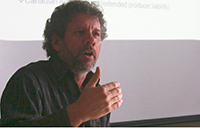The Canadian Labour Congress’ (CLC) new vice-president, Donald Lafleur, came to Glendon College recently to speak to a fourth-year seminar on climate change, work and labour about the climate crisis – what Canadian unions are doing to reduce greenhouse gases and the importance of building climate alliances.
By the time he and the students finished discussing the topic at the Nov. 20 event, a raft of new ideas for student climate engagement and links with the union movement, as well as many questions about how modern unions work, had taken shape.

Elected in May, Lafleur is the first Franco-Ontarian on the CLC executive and one of two vice-presidents on the CLC’s four-person Executive Committee. He began his working life as a postie in Northern Ontario and Ottawa, and was the fourth vice-president of the Canadian Union of Postal Workers when elected to the CLC.
Although much of Lafleur’s work focuses on internal union and collective bargaining issues, the intersection of labour with the environment is crucial for Canada’s climate future. To further this, he has always reached outside union structures to connect with social movements, linking social justice and climate justice. In 2008, he was named Labour Environmentalist of the Year. As the CLC’s newest vice-president, his portfolios include union political action, support for member unions, youth groups and climate action groups, with strong links to First Nations climate activists.
Lafleur’s talk, which was punctuated by lively discussion with students, ranged from how unions work and work for the environment to the importance of alliances, interesting new labour-climate initiatives in Canada and elsewhere, and how student groups are tackling climate change and university divestment of fossil fuels. On this last point, Lafleur noted that York University is one of the few Canadian universities that does not have a student-led fossil fuel divestment campaign.

Lafleur chairs the CLC’s Environment Committee. It is here that the CLC tackles climate change. From pressuring government and corporations to retrofit buildings to helping CLC unions begin green collective bargaining, reducing the carbon footprint of work and calling for legislation to force the “Big Three” automakers to take back vehicles at the end of their life, the CLC combines negotiation with employers to green their work practices with continuous pressure on government to legislate environmental responsibility. Mandatory end-of-life recycling of household appliances is now on the agenda. Dismantling and recycling end-of-life appliances and vehicles could become a source of new jobs.
Sometimes, climate change links to other social justice issues. For example, climate work allowed the CLC to bring to the attention of the Pension Advisory Council the environmental pollution and human rights infringements of Canadian mining company Goldcorp, raising the question of pension divestment.
The CLC’s climate work also turns inward to its affiliated unions. Working with national unions to build “climate literacy,” train union “green” stewards for the workplace and spread collective bargaining with employers to green work are some of the CLC’s growing areas of involvement.
Lafleur’s long involvement with socially conscious groups outside the labour movement is key to his recognition that building alliances is crucial if Canada is to make a turn towards a “green economy.”
From the Council for Canadians (partners in the struggle to keep water public) to the Green Economy Network, the Blue-Green Alliance (Canadian and United States environment-labour alliance) and Trade Unions for Energy Democracy (a movement to bring energy into public ownership, worldwide), the need for governments to play a larger role in dealing with climate change is front and centre. Lafleur contends that the need to return key parts of the economy, like energy to public ownership, has become an essential part of the climate change conversation.
Towards the end of Lafleur’s presentation, the students turned to their own role and training. Could undergraduates integrate climate research projects into their courses and, by doing so, contribute to the environmental movement? Could a co-op course be developed so that students could get job experience in social justice organizations? They continued talking with Lafleur about possibilities after the class ended.
Written by Jalal El-Halabi, an environment and health studies student at Glendon, and Jade Jiang, a student in environmental studies and sociology at Keele campus, with photos by Anna Russell, an environment and health studies student at Glendon


